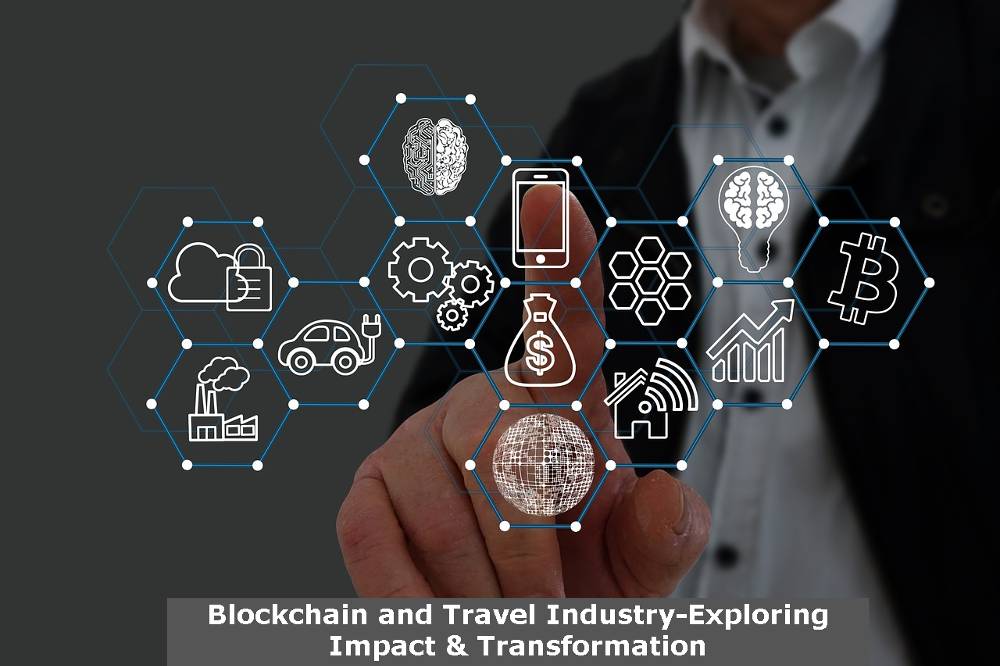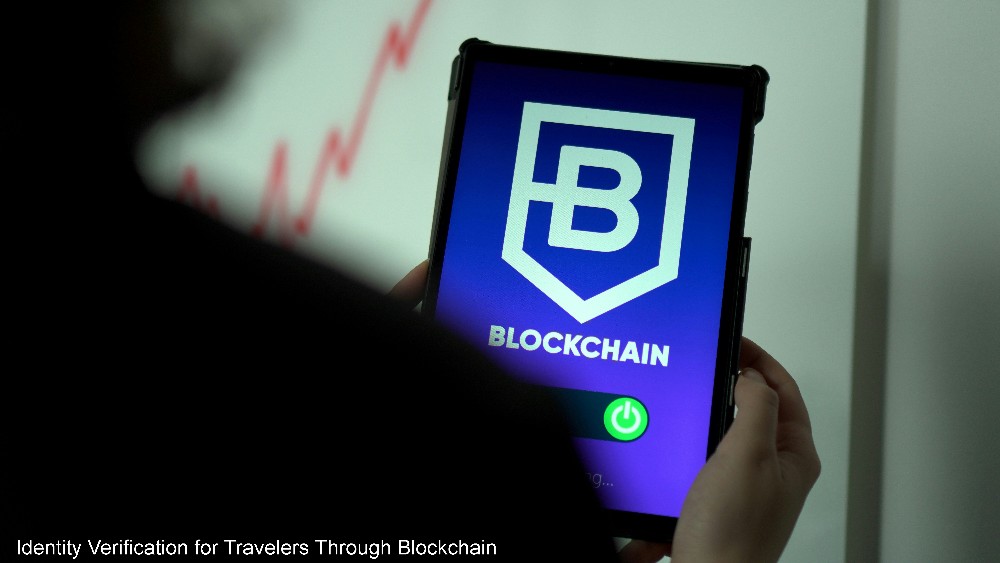
Curious about the collaboration between Blockchain and Travel, reshaping the industry? Explore the fascinating synergy that is revolutionizing the way we journey.
Blockchain, the digital ledger technology underpinning cryptocurrencies, offers more than just a decentralized currency system. It provides a foundation for reimagining traditional processes, particularly in sectors where trust, security, and seamless transactions are paramount. One such industry experiencing a profound shift is the travel and logistics industry in the United Arab Emirates (UAE).
In this guide, we’ll look into the profound impact of Blockchain technology in travel and logistics in the UAE. From understanding the fundamental principles of Blockchain to examining real-world applications and government initiatives, this blog uncovers the pivotal role Blockchain plays in shaping the future of travel and logistics in this dynamic region.
Read More: Future Scope of Blockchain Technology
Understanding What is Blockchain Technology?
Blockchain technology, at its core, serves as a decentralized and distributed ledger, fundamentally altering how information is stored and shared.
It is a chain of blocks, each containing a list of transactions. These blocks are linked and secured using cryptographic principles, forming an unalterable and transparent ledger. Unlike traditional centralized databases, Blockchain operates on a peer-to-peer network, allowing for a distributed and consensus-driven approach to record-keeping.
In the context of the travel and logistics industry, this decentralized structure holds immense potential. It introduces a level of trust and transparency that is crucial in an industry where multiple stakeholders, from airlines to customs, collaborate to facilitate seamless journeys.
A. Key Features like Decentralization, Transparency, and Security
In a decentralized system, no central authority or intermediary is controlling the data. This decentralization minimizes the risk of a single point of failure, ensuring robustness and reliability.

Every participant in the Blockchain network has access to the entire ledger, promoting transparency. This feature is especially vital in supply chain and logistics, where real-time visibility into the movement of goods is essential.
Blockchain employs cryptographic techniques to secure transactions, making it highly resistant to tampering and fraud. This level of security addresses the vulnerabilities present in traditional systems, enhancing the integrity of data.
B. Smart Contracts and Their Role in the Travel and Logistics Sector
Smart contracts are self-executing contracts with the terms of the agreement directly written into code. In the travel and logistics industry, these contracts automate and enforce the execution of agreements, reducing the need for intermediaries.
Smart contracts facilitate automated and programmable transactions. For example, in logistics, a smart contract can trigger payment upon the successful delivery of goods, eliminating the need for manual intervention.

The automation provided by smart contracts streamlines processes, reducing the time and costs associated with traditional contract execution. This efficiency is crucial in optimizing the complex workflows inherent in travel and logistics.
How Blockchain is Transforming the Travel and Logistics Industry
In the realm of travel, Blockchain technology emerges as a disruptive force, introducing unprecedented transparency, security, and efficiency.
Today, people are increasingly placing their trust in travel applications that leverage blockchain technology, with notable examples like Lifti leading the way. Lifti, among many others, has embraced the power of blockchain, instilling confidence in users through enhanced transparency, heightened security, and streamlined efficiency.
1. Enhanced Transparency in Supply Chains
Blockchain’s transparent and decentralized nature brings a new level of visibility to the travel industry’s intricate supply chains. From the manufacturing of components for aircraft to the handling of luggage, every step in the supply chain is recorded on the Blockchain. This transparency not only fosters trust among stakeholders but also enables real-time tracking of goods and services.
Airlines and logistics providers can leverage Blockchain to offer customers real-time visibility into the status and location of their luggage or shipments. This not only reduces the likelihood of lost items but also enhances overall customer satisfaction.
The immutability of Blockchain records ensures the integrity of the supply chain. Any attempts at tampering or unauthorized changes to the data are immediately detected, providing a secure and trustworthy system.
2. Improved Security and Reduced Fraud
Security concerns, especially in transactions and identity verification, have long been a challenge in the travel industry. Blockchain addresses these issues head-on by introducing robust security measures.
Blockchain’s cryptographic techniques secure financial transactions, reducing the risk of fraud and unauthorized access. This is particularly crucial in an industry where millions of transactions occur daily, involving airlines, hotels, and various service providers. Seamless and secure identity verification is a key aspect of the travel experience. Blockchain enables travellers to securely store and share their identity information, streamlining processes such as airport check-ins and hotel reservations while ensuring data privacy.
3. Streamlined and Efficient Payment Systems
Traditional payment systems in the travel industry often involve multiple intermediaries, leading to delays and added costs. Blockchain revolutionizes payment processes by introducing efficiency and cutting down on unnecessary complexities.
With Blockchain, direct transactions between service providers and consumers become possible, eliminating the need for multiple intermediaries. This not only speeds up the payment process but also reduces transaction fees. Smart contracts automate payment processes, ensuring that funds are released only upon the fulfilment of predefined conditions. This not only enhances trust but also minimizes payment disputes.
4. Seamless Identity Verification for Travelers
Identity verification is a critical aspect of travel, whether it’s at airport security or hotel check-ins. Blockchain simplifies and secures this process, offering a seamless experience for travellers.

Travellers can store their identity information on a decentralized Blockchain, reducing the reliance on centralized databases vulnerable to security breaches. Governments can leverage Blockchain for secure border control, ensuring the authenticity of travellers’ documents while streamlining immigration processes.
Impact of Blockchain in the Travel Industry
Blockchain’s integration into the travel industry goes beyond innovation; it fundamentally transforms the way businesses operate and users experience travel. We will explore the multifaceted impact of Blockchain, focusing on decentralization, enhanced security and trust, improved customer experience, and the incorporation of loyalty programs through smart contracts.
1. Removal of Middlemen and Intermediaries
- Blockchain’s decentralized nature eliminates the need for intermediaries in various travel processes, such as booking, payments, and authentication.
- This direct interaction between service providers and consumers reduces costs, minimizes delays, and fosters a more transparent and efficient travel ecosystem.
2. Direct Interactions Between Service Providers and Consumers
- Through Blockchain, travellers can interact directly with airlines, hotels, and other service providers, streamlining communication and customizing services based on individual preferences.
- This shift from a centralized model enhances the overall agility of the travel industry.
3. Immutable Records Ensuring Data Integrity
- Blockchain’s immutability guarantees the integrity of travel data, assuring stakeholders that information, from booking details to passenger records, remains secure and unaltered.
- This feature is pivotal in preventing fraudulent activities and ensuring trust among travellers and service providers.
4. Prevention of Fraudulent Activities, Such as Ticket Fraud
- The secure and transparent nature of Blockchain significantly reduces the risk of ticket fraud. Immutable records make it nearly impossible for malicious actors to manipulate ticket information, enhancing the overall security of the travel ecosystem.
5. Faster and More Secure Transactions
- Blockchain facilitates quicker and more secure transactions, enhancing the efficiency of payment processes, ticketing, and other financial transactions within the travel industry.
- This directly contributes to a seamless and stress-free experience for travellers.
6. Seamless and Personalized Travel Experiences
- With Blockchain-stored decentralized identities, travellers can seamlessly move through various touchpoints, from airport security to hotel check-ins, reducing wait times and paperwork.
- Smart contracts enable personalized travel experiences, as preferences and loyalty program details are automatically incorporated into service interactions.
7. Automation of Loyalty Program Rewards
- Blockchain’s smart contracts automate the issuance and redemption of loyalty program rewards, ensuring a seamless and transparent process.
- Travelers can enjoy the benefits of loyalty programs with increased trust in the accuracy and fairness of reward distributions.
8. Transparent and Tamper-Proof Smart Contract Execution
- Smart contracts on Blockchain execute loyalty program terms transparently and tamper-proof. This ensures that both travellers and service providers adhere to the predefined conditions, fostering trust in loyalty program engagements.
Blockchain Adoption in the UAE
The United Arab Emirates (UAE) stands at the forefront of technological innovation, and its embrace of Blockchain technology in the travel and logistics sector exemplifies a visionary approach. Let’s have a look at the initiatives taken by the UAE government, collaborations between the public and private sectors, and noteworthy success stories that highlight the country’s commitment to adopting and leveraging Blockchain in the travel industry.
Government Initiatives and Support
The UAE government has established forward-thinking policies to promote the adoption of Blockchain technology. These policies create an environment conducive to experimentation, innovation, and integration of Blockchain solutions in various industries, including travel and logistics.

The UAE has been proactive in developing a clear regulatory framework for Blockchain, providing a stable and secure foundation for businesses and organizations to explore and implement Blockchain solutions. This clarity encourages investment and fosters a thriving Blockchain ecosystem.
Collaboration Between the Public and Private Sectors
The synergy between government bodies and private enterprises is evident in the UAE’s approach to Blockchain adoption. Collaborative initiatives facilitate the development and implementation of Blockchain solutions in the travel industry, ensuring a harmonious integration of technology into existing systems.
The UAE has established innovation hubs and regulatory sandboxes, allowing businesses to test and refine their Blockchain solutions in a controlled environment. This approach encourages experimentation, accelerates innovation, and ensures that the technology is implemented seamlessly and securely.
Success Stories and Examples from the UAE
The Smart Dubai initiative is a testament to the city’s commitment to becoming a global leader in smart city technologies, including Blockchain. In the context of travel, Smart Dubai explores applications of Blockchain in areas such as identity verification, secure document sharing, and streamlined government services for travellers.
Launched by the Dubai Future Foundation, the Dubai Blockchain Strategy aims to make Dubai the first city fully powered by Blockchain by 2020. In the travel sector, this strategy envisions the seamless integration of Blockchain for secure and efficient travel experiences, from booking flights to passing through immigration.
As the UAE continues to lead in Blockchain adoption, the collaborative efforts between the government and the private sector underscore the nation’s commitment to embracing innovative solutions that enhance the travel and logistics industry.
Future Trends and Innovations in Blockchain Technology
The dynamic landscape of the travel and logistics industry in the UAE is continually evolving, driven by technological advancements. As we look toward the future, several emerging trends and innovations in Blockchain technology are poised to further transform the sector, shaping how businesses operate and enhancing the overall travel experience.
Potential Advancements in Blockchain Technology
Future Blockchain solutions may focus on enhancing interoperability, allowing different Blockchain networks to seamlessly communicate with each other. This could lead to a more connected and efficient travel ecosystem, where various stakeholders can securely share information across different platforms.
As Blockchain technology matures, efforts are being made to address scalability issues. Scalable Blockchain solutions can handle a higher volume of transactions, making them more suitable for the large-scale operations inherent in the travel and logistics industry.
Emerging Use Cases in the Travel and Logistics Industry
The tokenization of assets, such as airline tickets or hotel reservations, is an emerging trend. This involves representing real-world assets on the Blockchain through digital tokens, enabling more fluid and secure transactions.
Building on the concept of decentralized identities, future innovations may focus on creating more comprehensive and secure systems for managing traveller identities. This could streamline processes at airports, hotels, and other points of interaction during travel.
Continued Government Support and Industry Collaborations
Governments, including that of the UAE, are likely to continue supporting research and development initiatives related to Blockchain. Increased investment in understanding and harnessing the technology’s potential will contribute to its broader adoption in the travel sector.
The UAE’s commitment to international collaboration positions it as a key player in the global adoption of Blockchain technology. Collaborative efforts with other nations and organizations may lead to the development of standardized solutions that benefit the entire travel industry.
Sustainability and Environmental Impact
With its focus on sustainability, the travel industry may witness the emergence of green Blockchain solutions. Efforts to minimize the environmental impact of Blockchain technology, such as using renewable energy for mining processes, could align with the industry’s sustainability goals.
Blockchain can contribute to transparency in carbon offset initiatives. Smart contracts could be employed to ensure the integrity of carbon offset transactions, providing travellers with verifiable proof of their contributions to environmental conservation.
Conclusion
In conclusion, as Blockchain continues to redefine the travel and logistics landscape, the UAE stands as a beacon of innovation, setting the stage for a more efficient, secure, and sustainable industry.
The transformative impact of Blockchain is not just a technological evolution; it’s a testament to the nation’s unwavering commitment to progress and leadership in the digital era.
From optimizing supply chain operations to securing transactions and fostering seamless customer experiences, Blockchain has proven to be a catalyst for positive change. Initiatives like Smart Dubai and the Dubai Blockchain Strategy underscore the commitment to pioneering smart city technologies, with the travel sector benefiting from secure identity solutions and streamlined processes.

